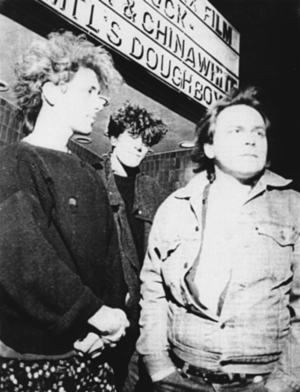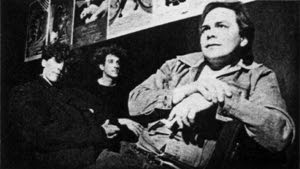|
Cities Magazine/June 1987 C L U B F L A M I N G O
The place screams punk. But that just goes to show you can’t judge a building by its color. The Club Flamingo, a seven-night-a-week, nonliquor nightclub on Gottingen Street, offers the most interesting and eclectic variety of entertainment available anywhere in the cities today. During an average week, the place might feature heavy metal, hardcore punk, rap, folk, reggae and rock and roll music, as well as a dance performance and a classic underground movie. The only constant the Club's three young owners — Greg Clark, 32; Keith Tufts, 25; and Derick Honig, 19 — demand is that the acts be original and entertaining; Top 40 bands need not apply. Club Flamingo's origins go back to 1983 and the closing of the old Grafton Street Café. That café had showcased many good, young local groups that didn't want to get caught up in the Top 40 bar scene but, while the Café helped to increase the audience for their original music, it wasn't enough to keep the Café open. Many of the Café’s patrons also frequented Backstreet Amusements, the video game parlour on Prince Street Greg Clark runs. Convinced a clientele existed for a new music club, Clark opened the first Club Flamingo on Grafton Street a few months later. That operation, which lasted four busy months, closed when Clark had to choose between renovating the small space it then occupied or begin looking for a new one. He opted to look for a new location. While he searched, however, Clark began sponsoring dances in any space he could find. That brought him into competition with Keith Tufts, then manager of the new CKDU-FM radio station, who had also begun sponsoring dances featuring alternate music. After trying one successful co-production, "we started to talk about working together, because the city wasn't big enough for us both to be doing the same thing." Their two-person collaboration became three when Honig, who was then working for Clark at Backstreets, signed on as a third partner. (Today Tufts books bands, Clark looks after day-to-day operations and Honig is a jack-of-all-jobs at the Club.) “We work well together,” Honig says. “We see eye-to-eye on things most of the time, and when we don't we're not afraid to say so.” Once they decided to work together, they combed the downtown Halifax area hoping to find a suitable location in the city core, but to no avail. They were told about one possible space on Gottingen Street, the old Cove Theatre, but quickly dismissed it "We thought it would be foolish, because we thought nobody ever went up there to see anything," says Clark. "Then a friend who's a real estate agent contacted us and asked us to come up and have a look. Once we looked inside, and found out the price, which was really reasonable, we said, well, it's not in the middle of downtown, but we'd never get a place like this downtown anyway. So we said let's do it here and see what happens." With a little financial help from a still-secret backer, the three friends bought and renovated the old cinema. (Whenever they're asked the identity of this fairy godperson, the partners lapse into unaccustomed accountant-like discourses on "cash injections" and "generating investor interest" but refuse to name the investor they say is simply someone who supports what they're trying to do.)
When the new Club Flamingo opened on Halloween, 1986, more than 1000 people came through the doors the first night. They believed they'd discovered a gold mine. They hadn't. They soon realized their original target audience of fans interested in underground alternative music wasn't large enough to support a club of its own, so they decided to expand the scope of their operations. "I think it's fair to say our philosophy has evolved since the Club opened," says Clark. "We were known for a punk image before we opened. But now we're trying to do good, exciting entertainment of a high quality. If it's local, we like it to be original material. But as far as other acts go, we have less of a focused approach; we like anything as long as it's done well." Club Flamingo has been particularly successful at attracting well-known international musicians and performers to Halifax. Groups like the Wailers and Spirit of the West, individual musicians like John Cale, Afrika Bambaataa and Fred Frith and poet Allan Ginsberg have all played the Club during its first few months of operation, giving the Club a reputation for pulling off the unexpected. How did they do it? "We just asked them," Clark says simply. "Nobody else around here had done that." No one else had paid much attention to local groups that wanted to play their own music either. Until Club Flamingo came along. Today, some of the groups that got their start at Club Flamingo, such as the Little Ministers, are beginning to show up at other better-known downtown nightclubs. The Club also gave new local groups a major boost six months ago by releasing a compilation album featuring local alternate music groups such The Lone Stars. "Our primary goal is to provide good entertainment," says Tufts. "It's like a highway. We want to help develop the local music scene and hopefully send that information about the Club elsewhere through the bands that play here. We want to get people to recognize this as a viable concert spot for varying sizes of acts. And I think, to a point, we've accomplished that. We're starting to open some doors with some of the biggest agents in North America." But all has not been roses for the young club. Although they try to offer entertainment that would appeal to a variety of ages, they've found it hard to shake their punk, underage image. "I think we've done a good job of confusing people in the city as to exactly what we are," Clark says with a laugh. "At the start, we were perceived as a kids' club, which we never tried to nurture. But we're a nonliquor club, so I guess that might lead some people to that assumption. I'm sure some people think that if they come in to see one of the movies we show, they’ll be 70 punk rockers hanging off the screen. It's not like that. The chances are that the people who come to see a specific movie, or even a specific act, will all have similar tastes. That's the message we have to get out to people." They're trying. With increasing publicity for specific events. With interesting film features. All three admit the experience of trying to make the Club a success has been an education in itself. Learning to predict local tastes in entertainment, which depend on the act, the price of the ticket, even the time of the year, is chancy at best. "No matter what we do, it's a bit of an innovation," says Tufts. "We still don't know, overall, what the city is interested in. Some things work really well, and others don't work at all. You have a lot of learning experiences." "It's always tempting to book a sure shot," adds Clark. "We could do lots of those. But that's not why we're here. It's harder this way, but we think it's better in the long run. I guess if I could wish for anything, it would be that people would just take some chances, and check out some of these acts. That would be terrific. And I think they would be more than pleasantly surprised at what they might find." |

